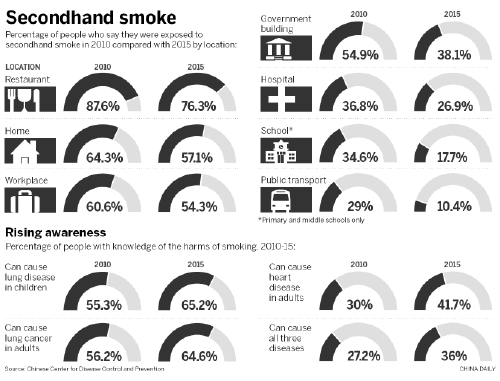Smoking rate holds steady despite reduction efforts
By SHAN JUAN (China Daily) Updated: 2015-12-29 07:48

Among all work units, government buildings, medical facilities and primary and middle schools saw the most substantial drop, the survey found. That's mainly due to increasing awareness of the health impact of passive smoke, Jiang said.
According to the report, nearly 65 percent of people are aware of the fact that passive smoke, like smoking, can lead to lung cancer. About 42 percent are aware of the link between passive smoke and heart disease.
Jiang said these figures are much higher than what was found in the 2010 survey. "But there remains much to be done."
More than 1 million people die every year in China because of tobacco use. About 740 million are routinely exposed to secondhand smoke, which leads to 100,000 deaths annually.
Bernhard Schwartlander, China Representative for the World Health Organization, said, "If tobacco use is not significantly reduced, it will aggravate the economic and social impact of an aging population, increasing the odds of a future economic slowdown, which will in turn pose a significant social challenge."
Wu Yiqun, deputy director of the ThinkTank Research Center for Health Development, said a national tobacco-control law is needed.
To date, many Chinese cities, including Beijing, have introduced public smoking bans and other legal measures to control the effects of tobacco. Such moves, the report found, have been well received by the general public.
More than 93 percent of those polled expressed support for smoking bans at hospitals and schools.
But support for bans was lower for restaurants (69 percent) and bars (41 percent).
- Billions in public funds recovered
- Hectic year of trips brought acclaim and growing influence to country
- Smoking rate holds steady despite reduction efforts
- Murder case 'highlights lapse in senior care sector'
- Policymakers drop legal ban on surrogacy
- China adopts first counter-terrorism law in history
- New law to stamp out domestic violence
- Chairman of China Telecom probed for corruption
- Newly passed laws pave way for a safer society
- NPC committee suggests deleting draft ban on surrogate pregnancy







